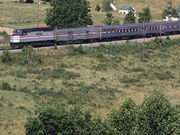Findings from NTSB suggest train engineer fell asleep while operating train
MONDAY, Nov. 23, 2015 (HealthDay News) — Findings from a National Transportation Safety Board (NTSB) investigation into a train derailment highlight the importance of diagnosing obstructive sleep apnea, according to a report published in the November/December issue of the Annals of Family Medicine.
Mary Pat McKay, M.D., M.P.H., from the NTSB in Washington, D.C., describes the findings of the board ‘s investigation into a Metro-North passenger train derailment, which occurred in the Bronx, N.Y., on Dec. 1, 2013. The derailment resulted in four deaths and injuries to 59 persons.
As part of the investigation, McKay reported that the engineer’s work schedule and sleep patterns were reviewed. The engineer was diagnosed with severe, obstructive sleep apnea. It was determined that the probable cause of the accident was the result of the engineer falling asleep due to undiagnosed, severe, obstructive sleep apnea, which was exacerbated by a recent circadian rhythm shift necessitated by his work schedule.
“This accident highlights the importance of screening, evaluating, and ensuring adequate treatment of obstructive sleep apnea, particularly among patients working in positions where impairment of physical or cognitive function or sudden incapacitation may result in serious harm to the public,” McKay writes.
Full Text
Copyright © 2015 HealthDay. All rights reserved.








